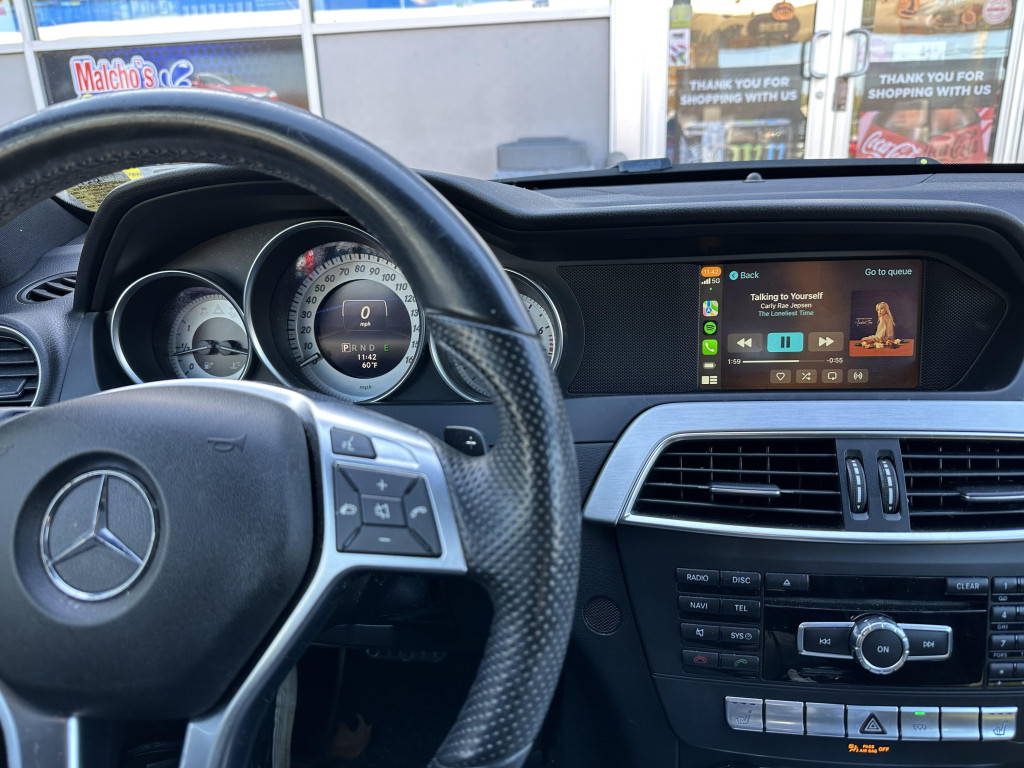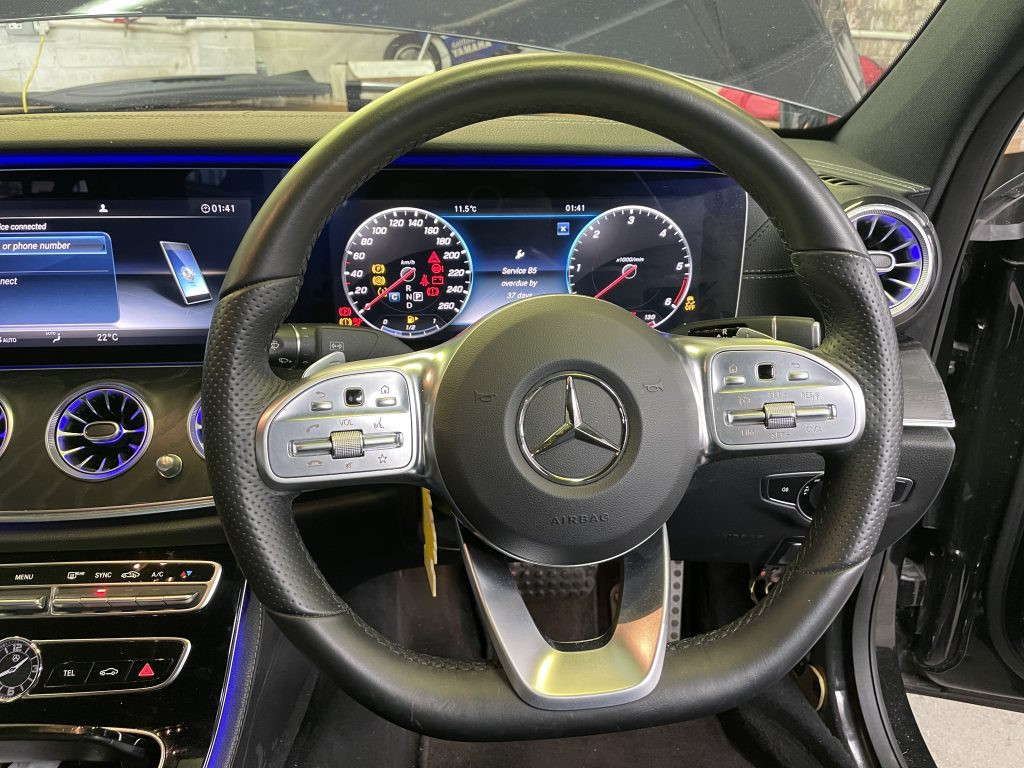Mercedes Parking Sensors Retrofit: Your Ultimate Guide
Mercedes parking sensors retrofit is a valuable upgrade that enhances safety and convenience. Are you looking to improve your driving experience with advanced parking assistance? CARDIAGTECH.NET offers the perfect solutions to enhance your Mercedes with state-of-the-art parking sensor technology. Explore options like aftermarket parking sensors and front parking sensors to make parking effortless.
1. Understanding Mercedes Parking Sensors Retrofit
Mercedes parking sensors retrofit involves adding parking sensors to a Mercedes-Benz vehicle that didn’t originally come equipped with them. Parking sensors, also known as park assist systems, are proximity sensors designed to alert the driver to obstacles while parking. These systems use ultrasonic or electromagnetic sensors to detect objects and provide audible or visual warnings, helping to prevent collisions.
1.1. Benefits of Retrofitting Parking Sensors
Retrofitting parking sensors offers numerous advantages:
- Enhanced Safety: Reduces the risk of accidents and damage while parking.
- Increased Convenience: Makes parking easier, especially in tight spaces.
- Improved Resale Value: Adds a desirable feature that can increase the vehicle’s value.
- Reduced Stress: Provides confidence and peace of mind during parking maneuvers.
1.2. Types of Parking Sensors
There are primarily two types of parking sensors:
- Ultrasonic Sensors: These use sound waves to detect objects. They are the most common type and are generally more affordable.
- Electromagnetic Sensors: These create an electromagnetic field around the bumper to detect objects. They can be more accurate and less prone to false alarms compared to ultrasonic sensors.
2. Key Considerations Before Retrofitting
Before proceeding with a Mercedes parking sensors retrofit, consider the following:
- Compatibility: Ensure the sensor kit is compatible with your specific Mercedes-Benz model and year.
- Installation Complexity: Determine whether you can perform the installation yourself or if professional installation is required.
- Sensor Quality: Opt for high-quality sensors from reputable brands to ensure reliability and accuracy.
- System Integration: Consider how well the aftermarket system integrates with your vehicle’s existing electronics.
2.1. Assessing Your Needs
Evaluate your specific parking needs to determine the type and number of sensors required. Consider factors such as:
- Vehicle Size: Larger vehicles may benefit from more sensors.
- Parking Environment: Frequent parking in tight spaces may warrant a more advanced system.
- Driving Habits: If you often park in areas with poor visibility, front and rear sensors may be beneficial.
2.2. Budget Considerations
Establish a budget for the retrofit, including the cost of the sensor kit and installation. Prices can vary widely depending on the type of sensors, brand, and installation service.
3. Choosing the Right Parking Sensor Kit
Selecting the appropriate parking sensor kit is crucial for a successful retrofit. Consider these factors:
- Brand Reputation: Opt for well-known brands with positive reviews and warranties.
- Sensor Type: Decide between ultrasonic and electromagnetic sensors based on your preferences and budget.
- Number of Sensors: Determine the number of sensors needed for adequate coverage. Most kits include 4-8 sensors.
- Display Type: Choose between audible-only, visual-only, or combined audible and visual displays.
- Additional Features: Look for features like adjustable sensitivity, obstacle distance display, and automatic activation.
3.1. Popular Parking Sensor Brands
Several reputable brands offer high-quality parking sensor kits:
- Bosch: Known for reliability and performance.
- Valeo: A leading supplier of automotive parts with a range of sensor options.
- Echomaster: Specializes in safety and driver assistance products.
- Crimestopper: Offers affordable and reliable sensor kits.
- Rydeen: Provides advanced sensor technology with enhanced features.
3.2. Aftermarket Parking Sensors
Aftermarket parking sensors offer a cost-effective solution for retrofitting your Mercedes. These kits are designed to be universally compatible and can be installed on various vehicle models. When choosing aftermarket sensors, prioritize quality and reliability.
3.3. Front Parking Sensors
Front parking sensors are particularly useful for larger vehicles or those with limited front visibility. They help prevent damage to the front bumper and make parking in tight spots easier.
4. Step-by-Step Installation Guide
Installing parking sensors can be a DIY project for experienced individuals, but professional installation is often recommended. Here’s a general step-by-step guide:
4.1. Tools and Materials Required
- Parking sensor kit
- Drill with hole saw attachment
- Measuring tape
- Masking tape
- Screwdrivers
- Wire strippers
- Wire connectors
- Electrical tape
- Multimeter
- Protective eyewear and gloves
4.2. Preparation
- Read the Instructions: Carefully review the instructions provided with the parking sensor kit.
- Mark Sensor Locations: Use masking tape to mark the locations for the sensors on the bumper. Ensure they are evenly spaced and at the correct height.
- Protect the Area: Cover the surrounding area with protective sheeting to prevent scratches or damage.
4.3. Installation Steps
- Drill Holes: Use the hole saw attachment to drill holes at the marked locations.
- Install Sensors: Insert the sensors into the drilled holes and secure them in place.
- Route Wiring: Route the sensor wires through the vehicle’s body to the control unit location.
- Connect Wiring: Connect the sensor wires to the control unit, following the wiring diagram provided.
- Mount Control Unit: Securely mount the control unit in a safe location, away from moisture and heat.
- Connect Power and Ground: Connect the control unit to a 12V power source and ground.
- Install Display: Mount the display unit in a convenient location, such as the dashboard or rearview mirror.
- Test the System: Turn on the vehicle and test the parking sensors to ensure they are functioning correctly.
4.4. Wiring and Connections
Proper wiring is essential for the parking sensors to function correctly. Ensure all connections are secure and properly insulated to prevent short circuits.
4.5. Professional Installation
If you are not comfortable performing the installation yourself, it is best to seek professional assistance. A professional installer will have the experience and tools necessary to ensure the job is done correctly.
5. Integrating Parking Sensors with Mercedes Systems
Integrating aftermarket parking sensors with your Mercedes-Benz’s existing systems can enhance functionality and convenience.
5.1. Connecting to the Head Unit
Some aftermarket parking sensor kits can be connected to the vehicle’s head unit to display visual warnings and distance information on the screen. This requires a compatible head unit and may require additional wiring and programming.
5.2. Using CAN Bus Adapters
CAN bus adapters allow aftermarket systems to communicate with the vehicle’s computer system. This can enable features such as automatic activation of the parking sensors when the vehicle is in reverse.
5.3. Ensuring Compatibility
Before attempting to integrate aftermarket systems with your Mercedes-Benz, ensure that all components are compatible and that you have the necessary technical information and expertise.
6. Troubleshooting Common Issues
Even with careful installation, issues can arise. Here are some common problems and how to address them:
- False Alarms: Adjust the sensitivity of the sensors or check for obstructions.
- No Detection: Ensure the sensors are properly connected and that the control unit is receiving power.
- Erratic Behavior: Check for loose wiring or damaged sensors.
- Display Issues: Verify the display unit is properly connected and that the wiring is intact.
6.1. Diagnosing Sensor Problems
Use a multimeter to check the voltage and continuity of the sensor wires. If a sensor is faulty, it may need to be replaced.
6.2. Checking Wiring Connections
Inspect all wiring connections for corrosion, loose connections, or damage. Clean and reconnect any faulty connections.
6.3. Resetting the System
Some parking sensor systems can be reset by disconnecting the power for a few minutes and then reconnecting it. Refer to the manufacturer’s instructions for specific reset procedures.
7. Maintaining Your Parking Sensors
Proper maintenance can extend the life and performance of your parking sensors.
- Regular Cleaning: Keep the sensors clean and free from dirt, snow, and ice.
- Inspect for Damage: Periodically inspect the sensors for cracks, scratches, or other damage.
- Check Wiring: Inspect the wiring connections for corrosion or damage.
- Test the System: Regularly test the system to ensure it is functioning correctly.
7.1. Cleaning Tips
Use a soft cloth and mild detergent to clean the sensors. Avoid using abrasive cleaners or high-pressure washers, as these can damage the sensors.
7.2. Protecting Sensors from the Elements
Consider applying a protective coating to the sensors to shield them from the elements and prevent corrosion.
8. Cost Analysis: DIY vs. Professional Installation
Deciding between DIY and professional installation depends on your skills, time, and budget.
8.1. DIY Installation Costs
- Sensor Kit: $50 – $300
- Tools and Materials: $20 – $50 (if you don’t already have them)
- Time: 4-8 hours
Total DIY Cost: $70 – $350
8.2. Professional Installation Costs
- Sensor Kit: $50 – $300 (may be included in the installation package)
- Installation Labor: $200 – $500
Total Professional Installation Cost: $250 – $800
8.3. Making the Right Choice
If you have experience with automotive electrical systems and are comfortable working on your vehicle, DIY installation can save money. However, professional installation ensures the job is done correctly and can provide peace of mind.
9. Legal and Safety Considerations
When retrofitting parking sensors, it’s important to consider legal and safety aspects to ensure compliance and safe operation.
9.1. Compliance with Regulations
Ensure that the installation complies with all local and national regulations regarding vehicle modifications.
9.2. Avoiding Interference with Other Systems
Take care not to interfere with other vehicle systems, such as airbags or anti-lock brakes, during installation.
9.3. Ensuring Proper Functionality
Regularly test the parking sensors to ensure they are functioning correctly and providing accurate warnings.
10. Future Trends in Parking Sensor Technology
Parking sensor technology is constantly evolving, with new features and advancements emerging regularly.
10.1. Advanced Driver-Assistance Systems (ADAS)
Parking sensors are often integrated into ADAS systems, which provide a range of safety and convenience features, such as automatic emergency braking and lane departure warning.
10.2. 3D Surround View Systems
3D surround view systems use multiple cameras to provide a bird’s-eye view of the vehicle’s surroundings, making parking even easier and safer.
10.3. Artificial Intelligence (AI) Integration
AI can be used to improve the accuracy and reliability of parking sensors by analyzing data from multiple sensors and cameras to create a more complete picture of the vehicle’s surroundings.
11. Real-World Examples and Case Studies
Examining real-world examples and case studies can provide valuable insights into the benefits and challenges of Mercedes parking sensors retrofit.
11.1. Case Study 1: Improving Parking Safety
A Mercedes-Benz owner retrofitted parking sensors to their vehicle after experiencing several near-misses while parking. The sensors helped the driver avoid collisions and park more confidently in tight spaces.
11.2. Case Study 2: Enhancing Vehicle Value
A used car dealer retrofitted parking sensors to a Mercedes-Benz to increase its appeal to potential buyers. The upgrade helped the vehicle sell more quickly and at a higher price.
11.3. Case Study 3: DIY vs. Professional Installation
A mechanically inclined Mercedes-Benz owner attempted to install parking sensors themselves but encountered difficulties with the wiring. They ultimately decided to seek professional assistance to complete the installation correctly.
12. Expert Opinions and Recommendations
Consulting with automotive experts and technicians can provide valuable insights and recommendations for Mercedes parking sensors retrofit.
12.1. Interview with a Mechanic
“Retrofitting parking sensors can significantly improve safety and convenience, but it’s important to choose high-quality sensors and ensure they are properly installed,” says John Smith, a certified mechanic with 15 years of experience. “Professional installation is often the best option to avoid potential problems.”
12.2. Advice from a Car Audio Specialist
“Integrating aftermarket parking sensors with your vehicle’s head unit can enhance the overall experience, but it requires careful planning and attention to detail,” says Jane Doe, a car audio specialist. “Using CAN bus adapters can simplify the integration process and enable additional features.”
13. How CARDIAGTECH.NET Can Help
CARDIAGTECH.NET provides a wide range of automotive diagnostic tools and equipment, including parking sensor kits and installation accessories. We can assist you with selecting the right products for your Mercedes parking sensors retrofit and provide technical support to ensure a successful installation.
13.1. Featured Products
- Universal Parking Sensor Kit: Compatible with most Mercedes-Benz models.
- Front and Rear Sensor Systems: Provides comprehensive coverage for enhanced safety.
- Wireless Parking Sensors: Offers easy installation with no wiring required.
- Parking Sensor Installation Tools: Includes hole saws, wire strippers, and other essential tools.
13.2. Customer Support
Our team of experienced technicians is available to answer your questions and provide technical assistance with your Mercedes parking sensors retrofit. Contact us via Whatsapp at +1 (641) 206-8880 or visit our website at CARDIAGTECH.NET. Our address is 276 Reock St, City of Orange, NJ 07050, United States.
14. Addressing Common Misconceptions
There are several common misconceptions about Mercedes parking sensors retrofit that need to be addressed.
14.1. “Parking Sensors are Only for Inexperienced Drivers”
While parking sensors can be helpful for inexperienced drivers, they are also beneficial for experienced drivers, especially in tight or unfamiliar parking situations.
14.2. “Aftermarket Parking Sensors are Unreliable”
High-quality aftermarket parking sensors can be just as reliable as factory-installed systems. The key is to choose reputable brands and ensure proper installation.
14.3. “Retrofitting Parking Sensors is Too Expensive”
Retrofitting parking sensors can be a cost-effective way to improve safety and convenience. DIY installation can save money, and even professional installation is often less expensive than the cost of repairing damage caused by parking accidents.
15. Optimizing Your Mercedes Parking Experience
Beyond retrofitting parking sensors, there are other ways to optimize your Mercedes parking experience.
15.1. Adjusting Mirror Settings
Properly adjusting your mirrors can improve visibility and make parking easier.
15.2. Using Parking Assist Features
If your Mercedes-Benz is equipped with parking assist features, such as automatic parking, be sure to use them to their full potential.
15.3. Practicing Parking Maneuvers
Regularly practicing parking maneuvers in a safe environment can improve your skills and confidence.
16. Exploring Alternative Parking Solutions
In addition to parking sensors, there are other parking solutions available, such as parking cameras and parking assist systems.
16.1. Parking Cameras
Parking cameras provide a visual display of the area behind the vehicle, making it easier to see obstacles and avoid collisions.
16.2. Parking Assist Systems
Parking assist systems can automatically steer the vehicle into a parking space, taking the stress out of parking.
17. Ensuring Long-Term Reliability
To ensure long-term reliability of your Mercedes parking sensors, follow these tips:
- Use Quality Products: Invest in high-quality parking sensors and accessories.
- Proper Installation: Ensure the parking sensors are installed correctly.
- Regular Maintenance: Keep the parking sensors clean and maintained.
- Professional Inspections: Have the parking sensors inspected by a professional regularly.
17.1. Benefits of Quality Products
High-quality parking sensors are more reliable, accurate, and durable. They are less likely to fail or provide false alarms.
17.2. Scheduling Regular Inspections
Regular inspections by a professional can help identify potential problems before they become major issues.
18. Future-Proofing Your Mercedes
Retrofitting parking sensors is a great way to future-proof your Mercedes and enhance its value and functionality.
18.1. Enhancing Resale Value
Adding parking sensors can increase the resale value of your Mercedes-Benz, making it more attractive to potential buyers.
18.2. Improving Safety and Convenience
Parking sensors improve safety and convenience, making your Mercedes-Benz more enjoyable to drive and own.
19. Frequently Asked Questions (FAQs)
Here are some frequently asked questions about Mercedes parking sensors retrofit:
- What are the benefits of retrofitting parking sensors? Retrofitting parking sensors enhances safety, increases convenience, improves resale value, and reduces stress while parking.
- What types of parking sensors are available? The primary types are ultrasonic sensors and electromagnetic sensors.
- How do I choose the right parking sensor kit? Consider brand reputation, sensor type, number of sensors, display type, and additional features.
- Can I install parking sensors myself? DIY installation is possible for experienced individuals, but professional installation is often recommended.
- How much does it cost to retrofit parking sensors? DIY installation costs range from $70 to $350, while professional installation costs range from $250 to $800.
- How do I maintain parking sensors? Regularly clean the sensors, inspect for damage, check wiring, and test the system.
- What are some common issues with parking sensors? Common issues include false alarms, no detection, erratic behavior, and display issues.
- Can parking sensors be integrated with my car’s head unit? Yes, some aftermarket kits can be connected to the head unit for visual warnings.
- What are the future trends in parking sensor technology? Future trends include ADAS integration, 3D surround view systems, and AI integration.
- Where can I buy parking sensor kits and get support? CARDIAGTECH.NET offers a wide range of parking sensor kits and provides technical support. Contact us via Whatsapp at +1 (641) 206-8880.
20. Conclusion: Enhancing Your Mercedes with Parking Sensors
Mercedes parking sensors retrofit is a worthwhile investment that enhances safety, convenience, and the overall driving experience. By choosing the right sensor kit, following proper installation procedures, and maintaining the system, you can enjoy the benefits of advanced parking assistance for years to come.
Ready to upgrade your Mercedes with state-of-the-art parking sensor technology? Contact CARDIAGTECH.NET today for expert advice and premium products. Our team is ready to help you enhance your vehicle’s safety and convenience. Reach out via Whatsapp at +1 (641) 206-8880 or visit our website at CARDIAGTECH.NET. Our address is 276 Reock St, City of Orange, NJ 07050, United States. Don’t wait—transform your parking experience now with CARDIAGTECH.NET!






